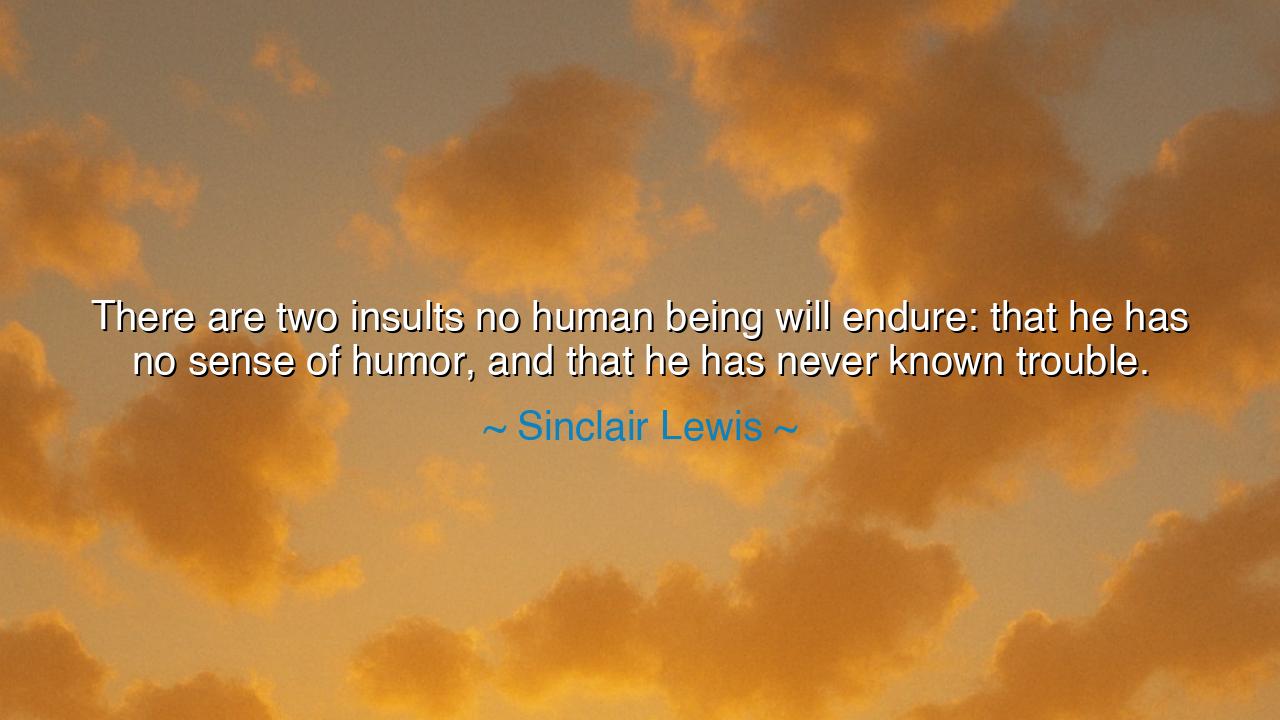
There are two insults no human being will endure: that he has no
There are two insults no human being will endure: that he has no sense of humor, and that he has never known trouble.






When Sinclair Lewis wrote, “There are two insults no human being will endure: that he has no sense of humor, and that he has never known trouble,” he was uncovering a deep truth about the soul of mankind — that within each of us, there dwells both the need for laughter and the dignity of suffering. His words, though simple, speak with the wisdom of the ages: a man stripped of humor is thought lifeless, and one untouched by hardship is thought untested. For humor and hardship together are the twin forges that shape the human spirit — the first softens, the second strengthens, and between them the heart learns to endure.
Lewis was a keen observer of human pride, the kind that builds kingdoms and conceals frailty. In his age, as in all ages, men and women longed to appear unbreakable, intelligent, sophisticated — yet beneath that armor, they feared being seen as either cold or untouched by life’s pain. Thus, he wrote that to say a man “has no sense of humor” is to declare him soulless, without empathy, without the warmth that binds human beings together. And to say he “has never known trouble” is to call him shallow, untouched by the struggle that gives life depth and meaning. One who has never laughed nor wept cannot understand what it means to live.
The ancients knew this well. The Greeks, who revered both comedy and tragedy, believed that the complete man must experience both. The theater of Athens was not mere entertainment — it was a temple for the soul. In one festival, the people would laugh at the absurdity of kings and gods; in the next, they would mourn the fall of heroes. This rhythm of laughter and sorrow was sacred, for it mirrored the very pulse of existence. To lack either was to be incomplete. So too did Sinclair Lewis, centuries later, remind his readers that humor and hardship are the two sacred tests of humanity: one proves our compassion, the other our courage.
Consider the life of Abraham Lincoln, whose humor became legend. Even as war tore his nation apart, he never lost the gift of laughter. His jokes, far from being frivolous, were weapons of wisdom — a balm to the wounded and a light to the weary. Yet beneath his humor was a well of sorrow: the grief of lost children, the burden of a divided people, the loneliness of leadership. He knew trouble intimately, and from that trouble, his humor gained its soul. His laughter was not the laughter of ignorance, but of understanding — the rare laughter that springs from compassion. Lincoln embodied the very truth Lewis described: that only one who has known suffering can laugh in a way that heals.
But there is another meaning hidden in Lewis’s words — a reflection on human vanity. We guard our pride fiercely, and to be told we lack humor is to be told we lack humanity; to be told we’ve never suffered is to be told we’ve lived without depth. These are not insults of the surface — they strike at the heart of identity. For even the proudest among us wishes to be seen as resilient and alive, not untouched and sterile. We yearn to be part of the shared story of humanity — the one that laughs through tears and stands, scarred but smiling, before the fire of life.
In this light, Lewis’s quote becomes both revelation and challenge. He calls upon us not only to cherish our humor but to embrace our troubles. To laugh freely is to show humility — to acknowledge that the world is too vast and strange for solemnity alone. To suffer deeply is to earn empathy — to join the brotherhood of all who have endured loss, struggle, and love. Together, these experiences weave the tapestry of what it means to be truly human. Without one, we are brittle; without the other, we are shallow. With both, we are whole.
Therefore, let this be the teaching drawn from his words: Seek not to live a life untouched by trial, nor one too proud to laugh. When hardship comes, meet it with courage; when absurdity arises, meet it with grace. Do not fear to laugh amid your pain, nor to feel pain amid your laughter. For the divine harmony of existence is found in this very balance — the marriage of joy and sorrow, of jest and endurance.
And when the time comes that another measures your worth, let them find in you both a heart that has known trouble and a spirit that still knows humor. For only those who can weep and yet still laugh — who have suffered and yet still smile — carry within them the full and radiant light of the human soul.






AAdministratorAdministrator
Welcome, honored guests. Please leave a comment, we will respond soon